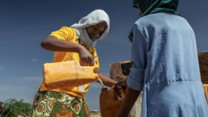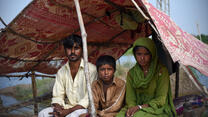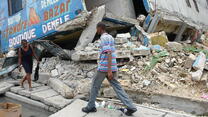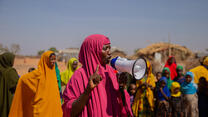More girls and women than ever before are displaced and living in humanitarian emergencies around the world. An often overlooked issue facing these girls and women is their ability to privately, safely and comfortably manage their monthly menstruation.
Progress has been made to increase access to the menstrual supplies women and girls need – though much more work is needed. But what to do with used materials – how to dispose or launder them – has been largely overlooked.
Privacy in a refugee camp is often scarce, and even if toilets are available, they often lack suitable waste bins. Disposal of the used materials can be a source of stress and embarrassment, and laundering – including proper drying -- reusable materials can be difficult. These barriers are often intensified by cultural beliefs and strong taboos surrounding menstruation – in many cultures, it is imperative to keep used materials hidden.
With funding from USAID/OFDA, the IRC and Columbia University have documented key learnings and solutions that have the potential to answer this question and make menstrual hygiene management easier for women and girls.
This new set of resources builds upon the MHM in Emergencies Toolkit – another resource developed by the IRC and Columbia University and co-published with 27 leading humanitarian agencies.
With support from USAID’s Office for Foreign Disaster Assistance (OFDA) the project developed the following new resources for MHM programmers in humanitarian emergencies:
Menstrual Disposal, Waste Management & Laundering in Emergencies: A Compendium
Also available in French and Arabic. Supported by USAID/OFDA and co-published by 16 leading WASH humanitarian responders, the Compendium aims to provide strategic guidance and examples of good practice from around the world and to support organizations seeking to rapidly address these critical and often overlooked aspects of an MHM response..
Monitoring Menstrual Hygiene Management Programming in Emergencies: A Rapid Assessment Tool (M-RAT) Guidance and Assessment Tool
This Rapid Assessment Tool is designed to assist the humanitarian community in evaluating the status and reach of MHM programming within an ongoing humanitarian emergency. The tool is designed to be forward-looking, focused on identifying areas for future MHM program improvement, and to prompt course-changes where appropriate.
Infographic: Key Components of a Female Friendly Toilet. Throughout Humanitarian spaces, women and girls find toilets difficult or impossible to access due to poor design. This infographic summarizes the components that can make toilets easier and safer to use.
Infographic: Menstrual Washing, Drying and Storage Needs of Displaced Girls and Women. Distribution of reusable sanitary materials is increasingly common in humanitarian responses, for financial and environmental sustainability. However, these materials do create a unique set of challenges, which must be addressed.
Infographic: Menstrual Disposal – Four Key Elements. Disposable menstrual materials need to be thrown away after use, which is not straightforward in the crowded, privacy-free conditions of humanitarian displacement. Humanitarian responders must consider the four key elements of waste disposal, in addressing this basic but often unmet need.
Publications:
M. Sommer, M. Schmitt, T. Ogello, P. Mathenge, M. Mark, D. Clatworthy, S. Khandakji, R. Ratnayake, 2018. Pilot testing and evaluation of a toolkit for menstrual hygiene management in emergencies in three refugee camps in Northwest Tanzania. Journal of International Humanitarian Action. 3. 10.1186 M. Schmitt, D. Clatworthy, T. Ogello & M. Sommer, 2018 Making the Case for a Female-Friendly Toilet Water. 2018. 10. 1193.M. Schmitt, M. Sommer, D. Clatworthy, G. Bramucci, E. Wheeler, R. Ratnayake. 2017. “Understanding the menstrual hygiene management challenges facing displaced girls and women: findings from qualitative assessments in Myanmar and Lebanon.” Conflict and Health. 2017, 11:19
M. Sommer, M. Schmitt, D. Clatworthy, G. Bramucci, E. Wheeler, R. Ratnayake. 2016. “What is the scope for addressing menstrual hygiene management in complex humanitarian emergencies? A global review.” Waterlines 35:3.



